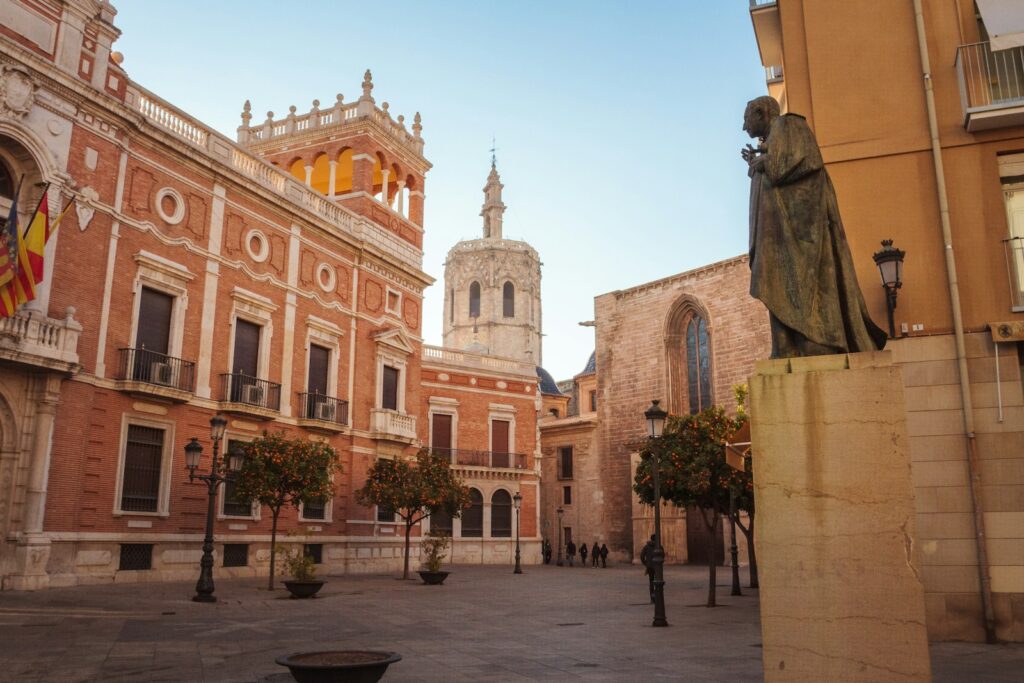Valencia is more than the birthplace of paella and oranges. This vibrant city showcases modern architecture, hosts some of Spain’s finest open-air beach bars and cafés, and provides convenient access to the Balearic Islands. The pristine sandy expanse between Valencia and Alicante is renowned as Spain’s Costa Blanca, a vacationer’s paradise.
A long-time industrial powerhouse of Spain, the city of Valencia has distinguished itself from Madrid and Barcelona by having a functional commercial role, as opposed to the more political and artistic nature of Spain’s two larger cities.
Valencia vs Alicante
As a center for science and technology, Valencia is home to some interesting science and cultural centers. The city certainly has its share of both historic and modern architecture and a handful of museums that are worth visiting. Simply due to its large size, Valencia has plenty of cultural activities and a thriving Spanish nightlife.
While Alicante, a small old port town in a beautiful setting on the south end of the Costa Blanca, gives visitors a taste of Spain’s sought-after and intoxicating atmosphere typified by Seville. The city continues long-time traditions of cultural performances and festivals despite the slow encroachment of tourists. The beach is second to none in this region, and inspires a nightlife that won’t disappoint.
Size and Feel
Valencia, the third-largest city in Spain with around 1 million population, plays a vital industrial role in the country. Unlike its neighbor Barcelona, it lacks a thriving international community, making it feel more like one large city instead of distinct neighborhoods. However, the University district provides a natural home for students studying in Valencia, offering a smaller, more community-oriented environment.
The neighboring Alicante, in contrast, is a smaller city with only 285,000 people. It has undergone a recent transformation, becoming an appealing destination for students and tourists. This has brought economic prosperity and a cultural infusion to this provincial port town.
Spoken Language
In the Valencia region, which is home to both the cities of Valencia and Alicante, Castilian Spanish and Valencian are both official languages. Valencian is quite similar to Catalan, spoken in Barcelona. The education system in the area has recently leaned towards a bilingual approach, making most Valencian residents fluent in both languages.
Weather
Valencia is a humid region, making the weather generally less pleasant than the southern coast. However, the climate is fairly temperate year-round, with ideal conditions in fall and spring. The summer brings an influx of tourists to the coast, especially affecting smaller towns like Alicante.
The Good, the Bad
What’s Great…
Valencia and Alicante are very different despite their proximity. Together, they share some points of appeal.
- The stretch between Valencia and Alicante is one long, beautiful beach stretching 300 miles up the Mediterranean Coast and drawing in thousands of tourists a year.
- The cuisine of the region is truly a step above other Spanish cities (especially those far from the coast), with delicious paella and other delightful seafood dishes.
- If high fashion and glamour aren’t your thing, the region of Valencia has the most down-to-earth crowd of any coastal area in Spain.
- The festivals of Valencia are spectacular, sure to impress visitors arriving in mid-March.
- Valencia is a hub of Spanish science, technology, and innovation, which draws an interesting crowd of technically-minded people to the community.
- Alicante has the climate and natural beauty of a tourist beach town without ever having lost its Spanish town feel. The city is still home to many old Spanish families and carries on naturally without being consumed by the tourist trade.
What’s Not good…
The entire region suffers from seasonal humidity, making the climate less pleasant.
Valencia is an industrial city, lacking the refinement and charm of Madrid or Barcelona.
Alicante is rather provincial compared to the southern coast, failing to keep up with trends or maintain any sort of international vibe.
